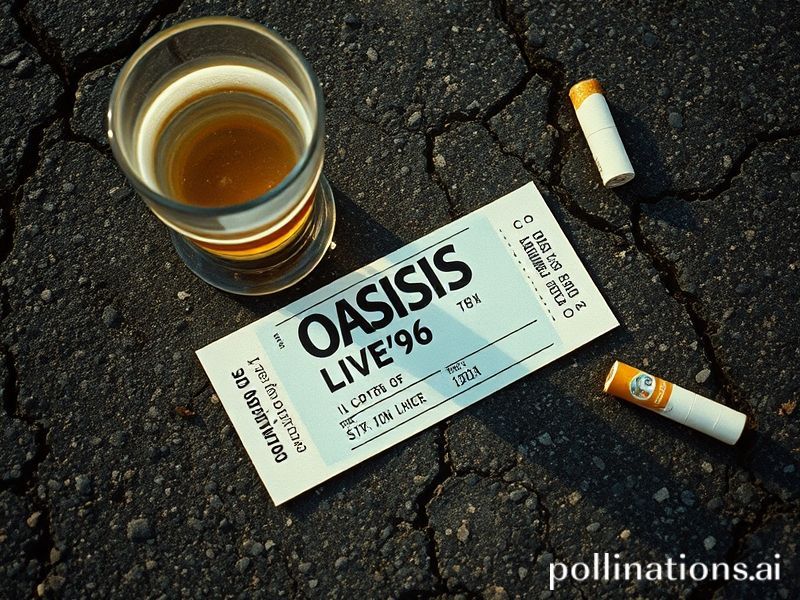Oasis Ticket Frenzy: How a Britpop Reunion Became the World’s Most Absurd Global Commodity
LONDON—At 08:59 BST last Saturday, 7.2 million browsers on every continent except Antarctica—where the Wi-Fi is still dial-up—were hammering refresh on Ticketmaster’s landing page. Sixty seconds later the queue was “paused for your safety,” a phrase normally reserved for rollercoaster malfunctions or incoming artillery. Thus began the global referendum on Oasis tickets, a geopolitical incident thinly disguised as a reunion tour.
The Gallaghers’ announcement landed like a diplomatic cable: “Oasis Live ’25, UK & Ireland only.” Translation: the former empire would once again dictate taste, while the colonies could watch the carnage on TikTok. From São Paulo to Singapore, reaction split neatly along two axes—those who remembered 1996 and those who had to Google it. Both sides agreed on one thing: Ticketmaster’s dynamic pricing model is the closest thing we have to a functioning international currency.
In Mexico City, scalpers—sorry, “secondary market facilitators”—priced standing-room wristbands at 45,000 pesos, roughly the annual salary of a maquiladora supervisor. In Lagos, cyber-cafés turned into ad-hoc war rooms as twenty-somethings bribed cousins in Manchester to stand in physical queues. Meanwhile, German fans discovered that EU consumer-protection laws let them cancel within fourteen days, a loophole now being stress-tested by every bored teenager between Hamburg and Hesse. Somewhere in Brussels, a eurocrat sneezed and accidentally harmonised ticket scalping across the single market.
The geopolitics are exquisite. Britain, desperate for soft power after Brexit, has weaponised nostalgia. Instead of gunboats, it sends Liam Gallagher’s sneer and a setlist from 1997. Washington responded with a statement that the special relationship remains “rock solid,” which is State-Department-speak for “we’re still not getting a U.S. leg.” Beijing’s censors briefly allowed #Wonderwall to trend, then throttled it once netizens began using “today is gonna be the day” as code for a stock-market rally.
Economists, never invited to the afterparty, note that resale prices now track the rouble-to-rouble exchange rate in inverse proportion to global serotonin levels. Crypto bros have minted OasisDAO, promising fractional NFT ownership of a hypothetical Dublin ticket—current market cap: $3.7 million, audited by nobody. The IMF is “monitoring the situation,” which is what it says when it’s too embarrassed to admit it queued at 9 a.m. like the rest of us.
Humanity’s capacity for self-delusion remains the only renewable resource. Thirty-year-olds who can’t afford rent somehow conjured £400 for a field in Knebworth, citing “mental health.” Airbnb hosts within a 50-mile radius are now charging more per night than a junior doctor makes in a week. The British press, never missing an opportunity to lecture the public, ran headlines about “greedy touts” while their parent companies operated the secondary sites. Somewhere, a journalism professor updated the syllabus under “Irony, Advanced.”
Yet beneath the farce lies a universal truth: we are all, at some level, nostalgic for a time when the worst thing imaginable was your brother calling you a potato at Glastonbury. In Kyiv, a soldier queued on his phone between sirens; in Gaza, a teenager used a cracked VPN to watch bootleg rehearsals. For three minutes and fifty-seven seconds, “Don’t Look Back in Anger” becomes a UN peacekeeping force more effective than anything with blue helmets.
By Tuesday, the resale market resembled a failed state: warlords (stubhub), currency collapse (face value £150, street price £1,200), and refugee crises (fans flying Lima–Dublin via Reykjavik because it was somehow cheaper). Ticketmaster issued a statement blaming “unprecedented demand,” corporate speak for “we are shocked—shocked!—that people wanted the thing we advertised.”
In the end, the tickets themselves are almost irrelevant. The real commodity is the queue, the shared misery, the collective hallucination that music can still dent the universe. On every inhabited continent, strangers swapped tips, VPNs, and conspiracy theories, united by the faint hope that five lads from Manchester might, for one night only, drown out the sound of everything else.
And if that isn’t worth 400 quid plus booking fee, then frankly, what is?







